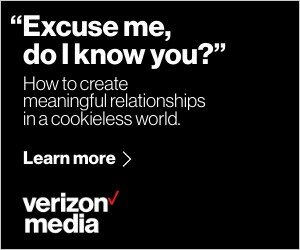Don't Get Left Behind In the Cookieless Future

An identity sea change is upon us, whether we're ready or not. It seems that every other day there's a new article or announcement that changes the rules of data engagement and making sense of the nuances and updates can be overwhelming. But our industry is at a critical mass when it comes to consumer privacy protections. Now is the time for advertisers and publishers to acknowledge reality and reclaim the narrative around privacy through a consumer-first approach by proactively educating and empowering users to own their part in the data value exchange.
The temptation to hang on to status quo is understandable. After all, according to the IAB's 2021 State of Data report, 76% of companies surveyed do not believe their revenue will be impacted by the loss of third-party cookies and identifiers. And while a full two-thirds of data leaders say they're prepared for this cookieless future, we're simply not seeing the sense of urgency from advertisers to adapt and change to meet privacy-centric concerns.
Recent announcements from Apple granting users full autonomy to opt out of device data tracking means advertisers and publishersmust identify new paths to success. It seems simple, but a consumer-first mindset based on trust and providing an appropriate value exchange needs to be done in a respectful, transparent way. If we don't give users the necessary controls - and there are enough examples over the past few years where the industry has done a poor job on that front - it ends up hurting everyone. Self-regulation and trust are the industry's most powerful levers.
As far as I'm concerned, we're not in the middle of an identity apocalypse; rather, the potential for a revolution rooted in direct connections with real people, driven by first-party data. In practice, this means building direct consumer relationships to serve as the cornerstone to cookieless identity solutions. Critical to acquiring opted-in user data is earning user trust. Users are more likely to volunteer information if they are confident in the personal value, they know they'll receive in return. It also means building various brand entry points for consumers to manage how much, if any, information will be used for targeting or cross device type messaging.

Somewhat paradoxically, doing this successfully can actually result in fewer ads being shown to the user. Now that you know who the user is and what their interests are, you can choose to show them high-value personalized ads, rather than try to monetize an ID-less page by sticking a number of lower-value ads on it. From terms of service to centralized privacy dashboards, offering opt-out options and member services to track and obtain consent gives consumers a voice in the data exchange conversation.
It also requires systems and technology that forge direct connections between advertisers and publishers to ensure data compliance and accountability at every level. The reliability of source data - where and how it's gathered - is everyone's responsibility. Right now, we're not seeing the collaboration at an industry-wide level when it comes to meeting new identity standards. Only 40% of brands are working directly with publishers (IAB State of Data), a clear sign that fragmentation and diluted data partnerships are still an issue.
At Verizon Media, we work with the haves and have-nots when it comes to first party data. We're a large publisher ourselves with a robust pool of first-party, opted-in data from across our ecosystem, giving us insights to build sustainable identity solutions with privacy and governance at the core. Our persistent identity solution, ConnectID, helps facilitate collaboration and unifies identity across Verizon Media's consent-based portfolio, but we're mindful of the fact that while a portion of supply will have addressability, perhaps a larger portion will be identity-less.
In the coming months, advertisers will need solutions that can leverage identity when available, but also need the ability to target with accuracy within an identity-less environment. We have developed a suite of Next-Gen Audience solutions that can help our advertisers maintain messaging relevance even in the absence of identity. And as the only independent ad platform with a full stack DSP and SSP, we allow for a single user match pool across demand and supplyfor better transparency, transactions and audience insights, without any third-party integrations required to get started.
In this critical moment when platforms like Google are taking a firm stance to support partners with first-party consumer relationships, providing personalized experiences to users that inspire them to continue engaging with you is more important than ever. To succeed in a cookieless future, the industry must face the inevitability of change, and fortify ourselves through a foundation built on direct relationships.
Click the social buttons to share this story with colleagues and friends.
The opinions expressed here are the author's views and do not necessarily represent the views of MediaVillage.com/MyersBizNet.


